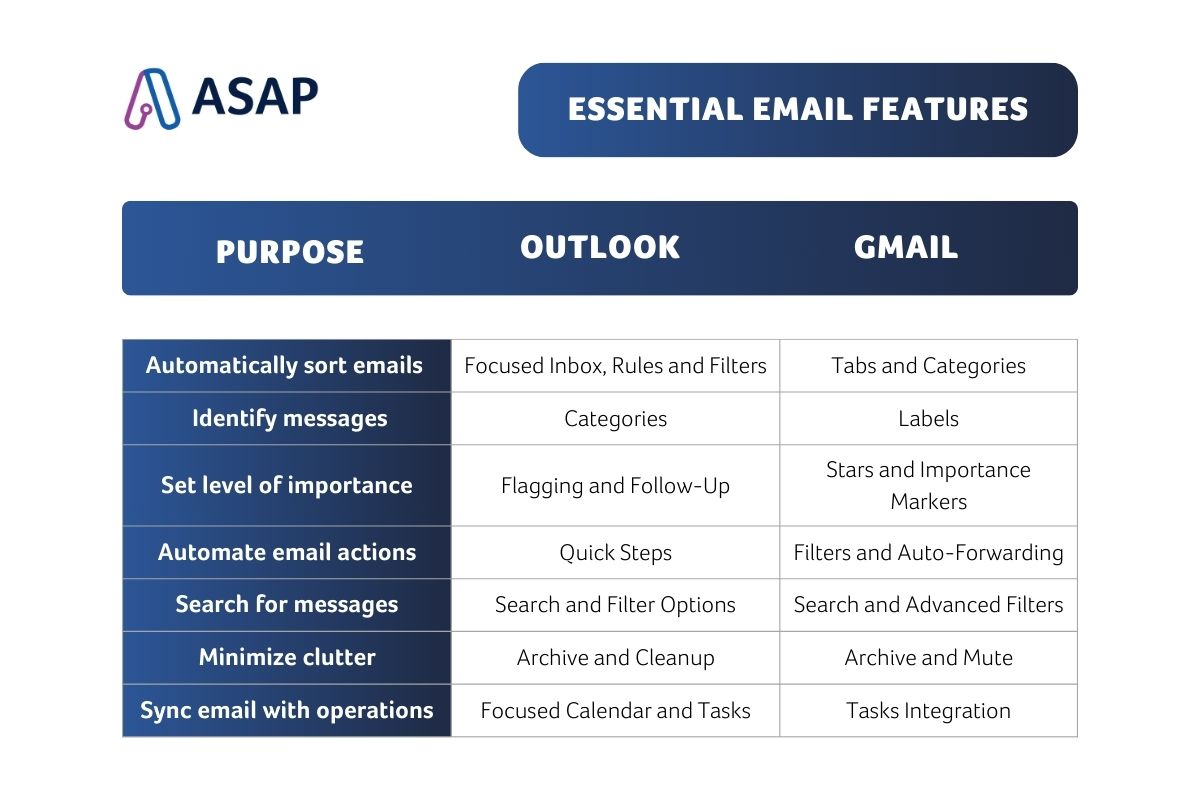All Things Admin Joins ASAP. Learn More ›
Email Inbox Mastery: A Comprehensive Guide for Hospitality Operations Managers
January 11, 2024

The sheer volume and diversity of emails that hospitality operations managers contend with on a daily basis would make some heads spin. To keep a bustling hotel, restaurant, or event venue running smoothly – especially during peak season – operations managers need practical email management strategies in place to prevent communication overload.
This guide walks through email management best practices and the tailored features available on email platforms like Microsoft Outlook and Gmail. Since operations managers oversee a broad range of responsibilities, from staff coordination to guest communication and vendor collaboration, a clean inbox is essential for an efficient and effective workflow.
Decoding the Email Overload Struggle for Operations Managers
Email is a major pain point for professionals regardless of their industry or career level. But for operations managers in the hospitality industry, the challenge of email management is on a whole other level.
Here are just a few of the emails operations managers must manage on a daily basis:
Reservation and booking inquiries: Operations managers oversee reservations and event inquiries, leading to a continuous influx of messages related to bookings, room availability, and event planning.
Customer feedback and requests: To ensure a positive guest experience and address issues promptly, operations managers field guest feedback, review special requests, and address customer service issues.
Staff coordination: Coordinating staff schedules, training sessions, and operational updates is a significant part of an operations manager’s role. This demands regular communication with the staff through email to convey important information and ensure smooth day-to-day operations.
Vendor communication: Whether liaising with vendors for an upcoming event or checking the status of a delivery, essential supplies, equipment, and services rely on email correspondence.
Event planning: Conferences, weddings, and corporate events aren’t just special occasions in the hospitality industry, they’re daily operations. All the logistics for these events are likely to be ironed out via email.
Overloaded inboxes cause bottlenecks in communication, disrupt workflow, and can lead to oversights. Managing this constant influx of emails efficiently is crucial for maintaining productivity in the hospitality industry.
Email Triage: Transforming Hospitality Operations Inboxes with Proven Tools
For busy operations managers, an organized inbox is paramount for an efficient workflow. A practical approach optimizes time management, enhances communication, and improves overall productivity.
These email management strategies will help you conquer the chaos:
Sort and filter messages: Categorize emails based on priority, sender, or topic to quickly identify and address the most important messages.
Pro tip: Create folders specific to guest responses, vendor communications, and event logistics to allow for a targeted response. Urgent requests from VIP guests or critical vendor updates can be quickly identified, ensuring swift and effective responses.
Automate routine email tasks: Automation features and Quick Steps in email platforms like Outlook can reduce the manual effort required for repetitive email actions.
Pro tip: Free up valuable time for more strategic decision-making by automating routine tasks such as reservation confirmations or event scheduling updates.
Define communication channels: Set clear protocols within the team to minimize unnecessary emails. Encourage the use of other communication channels, such as project management tools or instant messaging.
Pro tip: Project management tools become the go-to for detailed project discussions, while instant messaging, akin to a ticketing system in a bustling restaurant kitchen, handles routine guest requests with efficiency and precision.
Develop standard email templates: Save time on common scenarios by building a library of standardized email templates.
Pro tip: Whether acknowledging guest inquiries, sending vendor updates, or confirming reservations, having a library of standardized templates ensures professionalism, consistency, and significant time savings.
Both Microsoft Outlook and Gmail support a unified interface for emails, calendars, and tasks. Not sure where to find the platform’s email management tools? This table breaks down essential features that busy operations managers can benefit from using:

Ready to achieve inbox zero? Put these strategies to work with this step-by-step guide:
Systematically organize emails into folders to enhance accessibility and reduce clutter.
Create folders based on key categories, such as projects, clients, or internal.
Further categorize folders into subfolders for detailed organization
Use clear and consistent folder names for easy identification
Highlight and prioritize important emails for quick attention.
Assign clear levels of importance to emails, for instance, low, normal, and high.
Mark emails with flags to signify their level of importance.
Use different colored flags for varying levels of priority.
Automate incoming email organization.
Set up rules to automatically move emails to designated folders.
Create rules based on sender, subject, keywords, or other criteria.
Prioritize filtering rules to address urgent emails promptly.
Allocate dedicated time in the day for email management.
Schedule time in the day for email management.
Avoid constant email monitoring to enhance productivity.
Process emails in batches – responding, deleting, or filing emails systematically.
For hospitality operations managers, a clutter-free email inbox isn't just a matter of convenience; it's a strategic imperative. The nature of their role, spanning from coordinating events and managing staff to liaising with vendors and addressing guest inquiries, demands a high degree of organization and efficiency.
Why Saying No to Meetings is Essential Achieving Inbox Zero
Each minute is valuable, and dedicating time to meetings that do not directly contribute to strategic objectives can result in inefficiencies. With a formal process for declining meetings in place, operations managers can ensure their time is dedicated to impactful activities and set a precedent for a culture of efficiency within the organization.
Operations managers should articulate the rationale behind their decision to decline, whether it’s conflicting priorities, pressing deadlines, or the need for focused work time. This approach helps in managing expectations and underscores the commitment to effective utilization, aligning individual efforts with broader organizational goals.
As companies embrace remote and global operations, the importance of an organized inbox magnifies. It becomes the central hub for swift decision-making, clear communication, and streamlined collaboration. By decluttering their inboxes, operations managers not only alleviate the stress of information overload but also create a workspace that aligns with the dynamic and diverse nature of their responsibilities.
Start Building Your Library of Essential Templates
Download our guide to composing five common email types, complete with templates to follow.
Join the Conversation
Welcome to the ASAP Circle, a community platform for peer-to-peer conversation on trending topics, professional challenges, and shared experiences. We even have designated spaces for weekly Tuesday Coffee Breaks.









